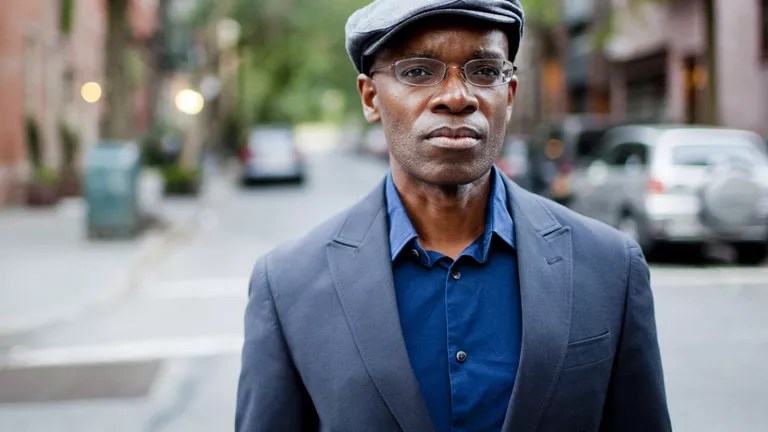
Greenleaf Music

Audio By Carbonatix
Although jazz drummer Rudy Royston, who has worked with Bill Frisell and Ron Miles, has lived on the East Coast since 2006, many of the experiences that inform his playing happened while he was growing up in Denver. When Royston was a kid, his father, who worked at a musical instrument factory, would send him instruments to try. Royston played them nonstop and started performing at church, learning how to listen and play music in response to what the preacher was saying.
Royston’s mother would play Minnie Riperton and Teddy Pendergrass, while his older brother listened to Bad Company, Led Zeppelin and Janis Joplin. By the time he was a freshman in high school, Royston was deft with church and hip-hop grooves. That year, a teacher played him a recording with jazz drummer Jeff “Tain” Watts, a collaborator of Wynton and Branford Marsalis, Betty Carter and Michael Brecker, and he began a lifelong obsession with jazz.
After a year at the University of Northern Colorado, Royston went on to the University of Denver, where he mastered the textures, colors and techniques of classical percussion.
“Every time I pick up my sticks,” Royston says, “it’s like my touch is all classical when I’m playing.”
He says that’s clear on his new solo album, PaNOptic, which drops Friday, June 19 on trumpeter Dave Douglas’s Greenleaf Music imprint. In many passages, you can hear every part of his drumming technique, even small details.
“And that’s not just from recording,” Royston says. “That’s from the way I learned to do different strokes in classical music – staccato and legato strokes, the way I learned about how subtle a cymbal roll can be. A pianissimo cymbal roll is barely audible, but it means everything. I learned that from classical, just the texture, the warmth that you can get from certain ways of attacking an instrument and certain ways of using the middle of the tom as opposed to the edge of the tom. Those kinds of things I learned playing classical. It’s the whole sonority of a drum set playing classical.”
While PaNOptic shows just how nuanced Royston can be as a drummer, the album also demonstrates how versatile he can be, something that’s reflected in the album’s title.
“When you think about the panoply of something, you think about the whole of it,” Royston says, “like the whole radius of the thing. It’s comprehensive. You see the whole thing. But with this record, you see the whole thing, but you’re seeing it just one thing at a time. You hear church, jazz, funk. You hear rock and classical. You hear all the stuff that I am. But it’s not like you can see it all at once. When I was playing, I was like, ‘You’re just playing everything that you know right now, basically. This is everything that you are. You’re just playing it.’ So it’s like, ‘This is all of me.'”
Royston describes the album as the story of his musical life. He originally planned to play some short pieces and maybe add some samples and overdubs later. But on the way to the studio about five years ago, he decided he just wanted drums and cymbals. He wanted it to be solo drum music yet full of melody, harmony, groove, emotion, style, color and texture.
The 23-song album is divided into four parts. The first is inspired by music and poems Royston likes. On the first cut, “BlaCk-Bad CoMPAny-BiRd,” Royston says he touches on the Beatles “Blackbird” and Bad Company’s “Feel Like Making Love.” The first section of the album also includes the track “deferred,” which was inspired by Langston Hughes’s poem “A Dream Deferred.”
The songs on the second section are tributes to jazz players like Frisell, with whom Royston has toured and recorded, as well as Ornette Coleman and Thelonious Monk. Royston pays homage to drummers like Elvin Jones, whose powerful technique has been a major influence, and Jack DeJohnette, whom Royston says has “a liquid sort of thing that he does where he moves smoothly over the drums.”
PaNOptic‘s third section is sacred music. Royston says growing up in the Pentecostal church was the most essential part of who he is as a person and a musician.
“That’s the basis of almost everything that I play,” Royston says, “because it’s just that whole sort of interaction and conversation in the music and the texture. And the flowing of it and the following the feeling of the room, the spirit of the room.”
The last part of the album is shaped by other music and poems he likes. “oNe SnaP fIngER” was inspired by Herbie Hancock’s phrasing and harmonic adventures on “One Finger Snap,” while “pop LOVE song” is inspired by the melody of Prince’s “The Most Beautiful Girl in the World,” and “We Real Cool” is an accompaniment to the Gwendolyn Brooks poem of the same name.
Royston recorded PaNOptic half a decade ago, but he was waiting for the right time to release it.
With a lot of musicians out of work because of the coronavirus shutdown, Royston wanted to drop it now and donate proceeds from the sales to MusiCares COVID-19 Relief Fund.
“I’m going to donate the money to people who are in need, because we all are,” Royston says. “If I’m hurting and I get a little bit of help from unemployment or whatever, I’m cool. But imagine other people who were really hurting. There are some people who are struggling more than I am, so it doesn’t make any sense for me to try to make a bunch of money for myself now when we’re all struggling together. Let’s do this together.”